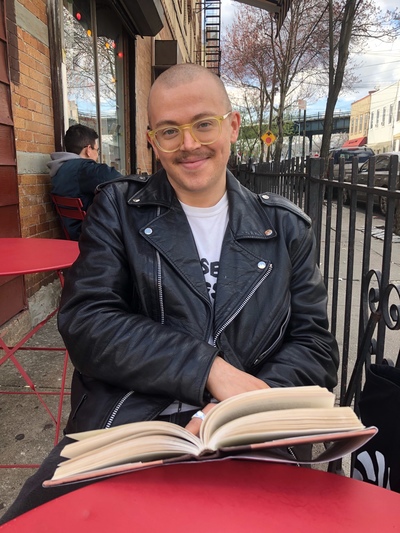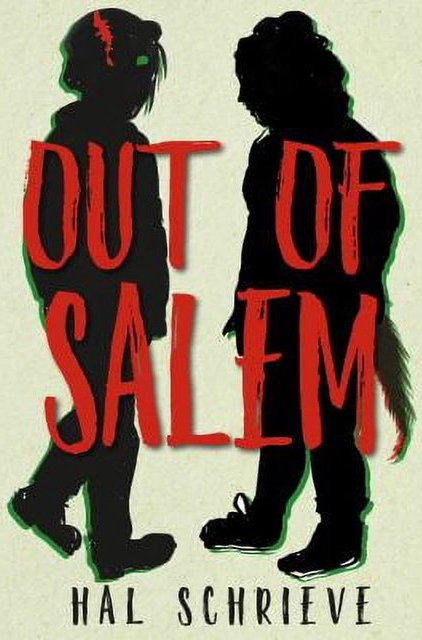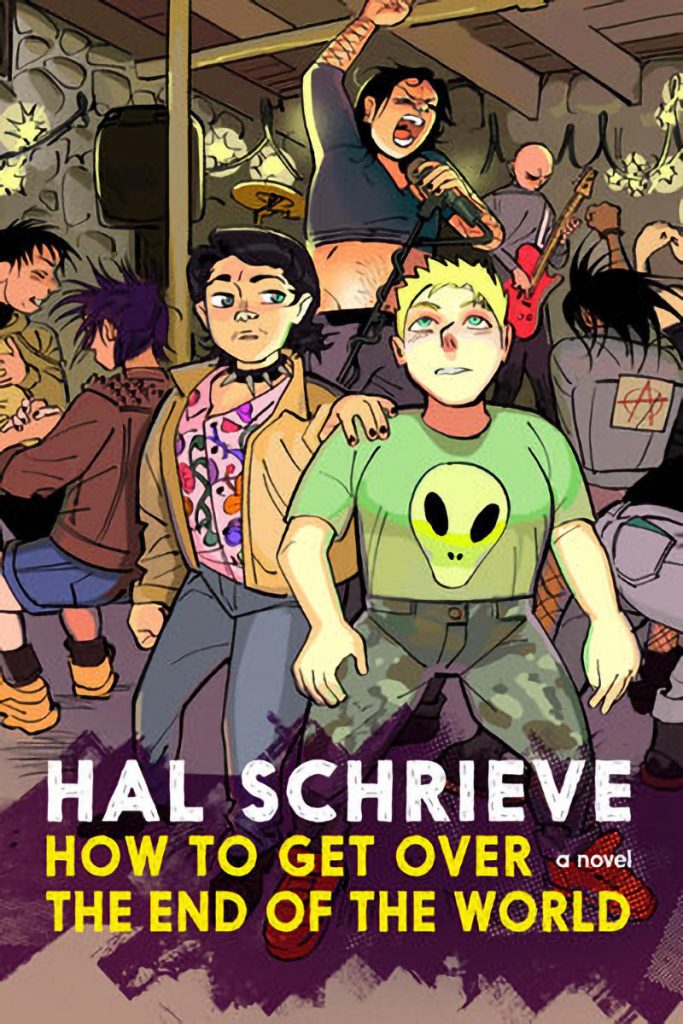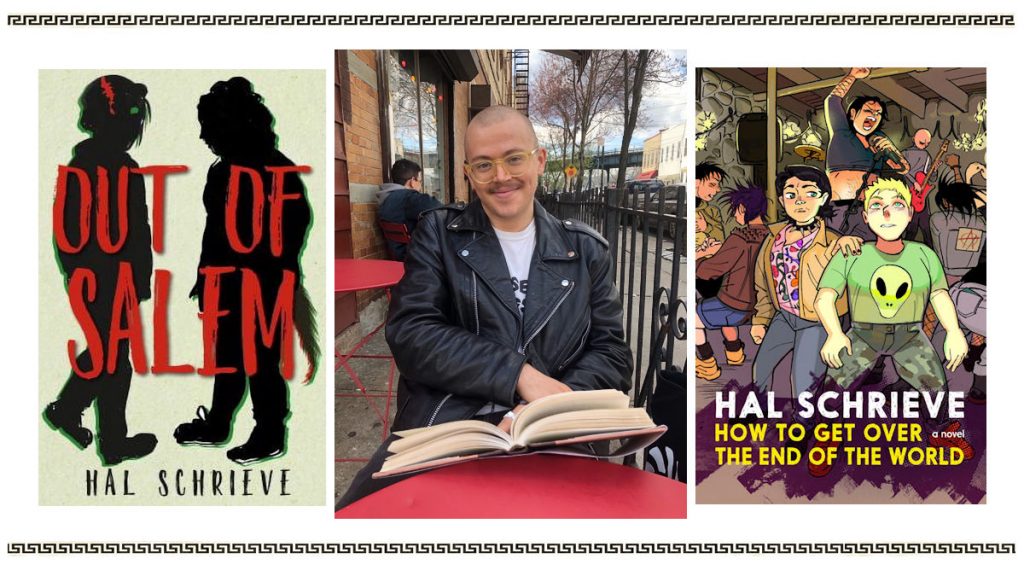by Alec Clayton

Boldly weird, cool, and confident, this YA novel of LGBTQ+ teen artists, activists, and telepathic visionaries offers hope against climate and community destruction. From the National Book Award–longlisted author of Out of Salem.
Olympia Lovers of zombies and werewolves and queer lit have likely already read Hal Schrieve’s young adult novel Out of Salem. Chances are they were at Schrieve’s well-attended reading and book discussion of that first novel at Browsers in downtown Olympia in March 2019. That book was about 14-year-old genderqueer zombie Z and their classmate, lesbian werewolf Aysel, living in an alternate Salem, Oregon during the development of an anti-monster fascist movement. Aysel and Z develop tenuous connections with other magical beings to stay alive — in Aysel’s case because werewolves are being framed for a murder, and in Z’s case because their body is falling apart. “I wrote it with an older middle-grade or younger YA audience in mind, Schrieve says.
“I wanted to speak to the life-or-death crises queer youth still find themselves in because of external violence. I think that while it was my first book and perhaps unsubtle, I still stand by its concerns and find them if anything more pressing now, with escalating attacks by the right on trans youth healthcare, housing, and immigrant populations.”
“I think my intended readership for Out of Salem was someone who was 12 to 14, since the characters are 14. I think the people that tended to read it were a little older than that; I have gotten a couple letters from people who were assigned it in college courses, which is surprising to me. How to Get Over the End of the World is for older teens, in terms of my target audience, since the characters are 17; I imagine it may also be read by people a little older than that,” Schrieve explains.

It concerns itself less with external homophobia and transphobia, though that still affects characters. “Instead, what I wanted to think about and write about was how queer communities that serve youth operate and the ways they sustain people and can let them down, and how even relatively supportive spaces can be complicated to navigate because of different kinds of kids’ investment and needs, and the interests and feelings of queer adults involved — who often are trying to repair something but don’t know how. It’s something I think about a lot because of how important Olympia nonprofit Stonewall Youth was in my own adolescence. There’s a huge punk music community and also many small institutions full of people who want to make safe all-ages queer spaces for kids — the kind that are now framed by the right as dangerous for impressionable kids. I needed those spaces, though they weren’t perfect: there were middle-class kids dealing with parental rejection alongside kids with urgent housing needs, and we all made friends and fought and went to some shows and made some shows happen and gave each other rides and hung out at Dumpster Values and the library parking lot. We clung to any older queer figures in our lives (usually artistic role models or nonprofit employees) as powerful guides, and were eager to demonize them when they failed us in big or small ways.
“The book is not literally about Stonewall, as it is fiction — and those parts that are borrowed from reality are ten years old — but I have written about a close corollary, an LGBT youth group that provides teens a social space and resources, but which is struggling financially and lacks the capacity to care for everyone. The central characters — James, Orsino, and Ian/Monique, all end up needing to take care of each other and make things happen on their own, even as they look to elders for advice. James is in love with his two friends at once and has to learn he isn’t the center of the world; Orsino struggles with the fallout from his father’s abuse and housing instability, and Ian/Monique finds her artistic voice and learns to stand up for herself with her friends. Meanwhile, aliens positioning themselves as founts of cosmic wisdom try to speak with both Orsino and punk mentor Jukebox, the latter of whom becomes convinced that they alone can save the whole world from violence with music based on the aliens’ wisdom.”
Schrieve, who grew up in Olympia and now lives in New York City and works as a children’s librarian, says, “I hope it resonates with people from Olympia! It is very inflected by my own teen years 2010-2014.”

Hir debut novel, Out of Salem, was longlisted for the National Book Award for Young People’s Literature in 2019. Hir poetry has appeared in Vetch magazine, and hir comics have been featured in Stacked Deck Press’s 2018 anthology We’re Still Here. Schrieve said, “I enjoyed presenting my book to people from my hometown — this one is, if anything, much closer to home, and I hope to be able to compare experiences with people who have stayed in Olympia and seen it change for the last ten years.”
A slightly overblown (Schrieve’s word) publisher’s blurb states: How to Get over the End of the World confirms Schrieve as a unique and to-be-celebrated voice in LGBTQ+ YA fiction with this multi-voiced story about flawed people trying their hardest to make a better world, about the beauty and craziness of hope, about too-big dreams and reality checks, and about the ways in which human messiness — egos, jealousy, insecurity — and good faith can coexist. It is also about preserving the ties within a chosen family — and maybe saving the world — through love, art, and acts of resistance.
The attractive covers for both books were created by Stewart Cauley (font, color, back jacket, typesetting). The cover illustrator was Casey Nowak. Schrieve did the silhouettes and interior drawings on Out of Salem.
Praise from Fellow Writers
“How to Get over the End of the World would have been phenomenal and necessary even without the science-magic: queer and trans teens, playing in bands, falling in love, raising hell, fighting and friending and living radical lives. But, there is science-magic. Aliens and telepathy and vibes. This is the book we need right now.”
—Michelle Tea, author of Black Wave
“Hal Schrieve has proven hirself a virtuoso of vital, immediate trans storytelling. How to Get over the End of the World is a brave salvo against anodyne trans YA, richly populated by messy, earnest, colorful characters. You’ll love them, loathe them, and fall in love with them all over again. Trans kids are under attack. How to Get over the End of World will show them how to fight back.”
—Peyton Thomas, award-winning author of Both Sides Now
“How to Get Over the End of the World feels wholly original—a punk rock opera that finds a way to blend sci-fi, coming-of-age, and inspiration that maybe we can fix this messed up world. No one writes the contemporary teen voice better than Hal Schrieve.”
—Colleen AF Venable, author of the National Book Award Longlisted Kiss Number 8
“Growing up and being trans and aliens, oh my! How to Get Over the End of the World is one of those rare novels that combines razor-sharp wit with a courageous and tender heart. With pitch-perfect accuracy and fearless honesty, Hal Schrieve evokes the raw wild magic of queer and trans adolescence with characters that are at once astoundingly realistic and delightfully larger than life. Ferociously intelligent and relentlessly authentic, this book has all the makings of a queer cult classic.”
—Kai Cheng Thom, author of Fierce Femmes and Notorious Liars: A Dangerous Trans Girl’s Confabulous Memoir
“A story exploding with voice and vulnerability, How to Get over the End of the World is electric and soft and honest and powerful and left me buzzing. I’ve never read such a raw depiction and reflection of my trans and queer identities, and I’m beyond excited for young readers who’ll get to read this book and feel seen by Hal’s words. Simply magical. Very gay.”
—Kacen Callender, author of the National Book Award-winning King and the Dragonflies and the bestselling novel Felix Ever After
WHAT
Hal Schrieve: reading from How to Get Over the End of the World
WHEN
6-7 p.m., Wednesday, October 25
WHERE
Browsers Books 107 Capitol Way N, Olympia
HOW MUCH
The event is free, the book is $19.95, hardback

